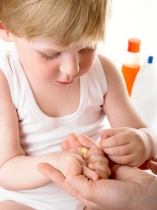It’s official – the Chief Medical Officer is ‘profoundly ashamed’. In her report on child health, Professor Dame Sally Davies highlights appalling inequalities in the UK, with three times as many child deaths in the poorest areas compared with wealthier regions, and shows us to be a nation lagging behind our European neighbours too. Much more needs to be done to improve the health of Britain’s children and it needs to be done sooner, she says. Early, preventive action rather than reaction will benefit both the health and the wealth of the nation. I thought I’d take a look at where Cochrane evidence might fit into her vision of what needs to be done.
Rickets is not a thing of the past
This isn’t news. In a report early last year Dame Sally put a spotlight on the problem of vitamin D deficiency and the reappearance of rickets, a condition caused by a lack of vitamin D, which affects growing bones and is more often associated with Victorian times than modern day Britain. Since 2006, the ‘Healthy Start’ scheme has made vitamin  supplements available to some pregnant women and to children in low-income families, but the new report recommends that NICE examines the cost effectiveness of extending the provision of vitamin A, C and D supplements to all children under five. The CMO points out that “vitamin D deficiency is not just about poverty”; the growing trend for children to spend more time indoors and to cover up in the sun is adding to the problem.
supplements available to some pregnant women and to children in low-income families, but the new report recommends that NICE examines the cost effectiveness of extending the provision of vitamin A, C and D supplements to all children under five. The CMO points out that “vitamin D deficiency is not just about poverty”; the growing trend for children to spend more time indoors and to cover up in the sun is adding to the problem.
A Cochrane review on vitamin D supplementation for improving bone mineral density in children found the small amount of evidence available suggested that supplements may be helpful for children with low levels of vitamin D but that further randomized controlled trials involving children with vitamin D deficiency are needed. Let’s hope there’s an update soon and new trials available to add to the evidence. Two new Cochrane reviews are under way, one looking at vitamin D supplementation in infancy for improving bone density and the other on vitamin D supplementation for preventing infections in children less than five years of age.
Stopping smoking in pregnancy would reduce premature births
There’s a newly updated Cochrane review on psychosocial interventions for supporting women to stop smoking in pregnancy, with data on over 29,000 women. It found that these  interventions, such as counselling, can help pregnant women stop smoking and are well received by most, possibly having a positive effect on their mental health too. Offering incentives was the most effective strategy but only when provided intensively. Preterm births (before 37 weeks) and low birthweight babies were both reduced by 18% in women who received psychosocial interventions. The authors say this review “provides strong and clear evidence about the risks of smoking during pregnancy, supporting recommendations that it may be an integral part of strategies to reduce preterm births”.
interventions, such as counselling, can help pregnant women stop smoking and are well received by most, possibly having a positive effect on their mental health too. Offering incentives was the most effective strategy but only when provided intensively. Preterm births (before 37 weeks) and low birthweight babies were both reduced by 18% in women who received psychosocial interventions. The authors say this review “provides strong and clear evidence about the risks of smoking during pregnancy, supporting recommendations that it may be an integral part of strategies to reduce preterm births”.
Young people and mental health
This is another key strand of the report, which notes that three-quarters of mental health problems start before the age of eighteen and that one in ten adolescents is suffering from a mental health problem at any one time. It calls for a regular survey on children and young people’s mental health, including comparison with other developed countries. A Cochrane review on alternatives to inpatient mental health care for children and young people concluded that the quality of the evidence base provides little guidance for the development of services and that addressing this was a high priority. Let’s hope better studies are under way and that they are assessing and reporting the young people’s and their parents’ or care givers’ satisfaction with services, something which was notably missing from the studies included in this review.
people’s mental health, including comparison with other developed countries. A Cochrane review on alternatives to inpatient mental health care for children and young people concluded that the quality of the evidence base provides little guidance for the development of services and that addressing this was a high priority. Let’s hope better studies are under way and that they are assessing and reporting the young people’s and their parents’ or care givers’ satisfaction with services, something which was notably missing from the studies included in this review.
Tackling obesity
The report estimates the long-term annual cost of childhood obesity as approaching £700 million and says as many as 12.5% of toddlers are obese, as are 16% of girls and 17% of boys up to the age of fifteen. The spotlight is on prevention and particularly encouraging participation in physical activity, with Public Health England working together with local authorities, schools and relevant agencies to build on current efforts to achieve this.
A Cochrane review on interventions for preventing childhood obesity found good evidence  that child obesity prevention programmes can work and, whilst it wasn’t possible to say which components of the programmes were most effective, promising policies and strategies were these:
that child obesity prevention programmes can work and, whilst it wasn’t possible to say which components of the programmes were most effective, promising policies and strategies were these:
- at school: a curriculum that addresses healthy eating, body image and exercise; more physical activity sessions; support for teachers and other staff (such as professional development opportunities) to carry out health promotion activities
- at home: parent support and home activities that encourage children to be more active, spend less time in front of a screen, and eat more healthily
Moving on from prevention to management, this month NICE has issued new guidance on managing overweight and obesity in children and young people, which focuses on lifestyle weight management services.
Let’s celebrate our children!
These are just some of the things mentioned in the report and you can get the full document, a summary and a list of the recommendations here. As half term draws to a close for many of us, I’ll just mention Dame Sally’s suggestion that we have a new national children’s week to celebrate children and young people and bring together organizations with the power to work for their good, including charities, government and the NHS. If you’re interested to see what this could look like, Australia has one every October and you can read about it here.
Interestingly, the report emphasizes the need to help young people develop resilience. This and other themes in the CMO’s report have reminded me of a quote from author Neil Gaiman, which has stayed with me since I read it, and I hope I can be excused for ending with it here:
I’ve been making a list of the things they don’t teach you at school. They don’t teach you how to love somebody. They don’t teach you how to be famous. They don’t teach you how to be rich or how to be poor. They don’t teach you how to walk away from someone you don’t love any longer. They don’t teach you how to know what’s going on in someone else’s mind. They don’t teach you what to say to someone who’s dying. They don’t teach you anything worth knowing.
Links:
Great Britain. Department of Health (2013). Chief Medical Officer: Prevention pays – our children deserve better [press release]. 24 October 2013. Available from: https://www.gov.uk/government/news/chief-medical-officer-prevention-pays-our-children-deserve-better
Great Britain. Department of Health (2012). Dangers of vitamin D deficiency highlighted [press release]. 6 February 2012. available from: https://www.gov.uk/government/news/dangers-of-vitamin-d-deficiency-highlighted
Winzenberg TM, Powell S, Shaw KA, Jones G. Vitamin D supplementation for improving bone mineral density in children. Cochrane Database of Systematic Reviews 2010, Issue 10. Art. No.: CD006944. DOI: 10.1002/14651858.CD006944.pub2.
Winzenberg TM, Shaw KA, van der Mei IAF, Jones G. Vitamin D supplementation in infancy for improving bone density (Protocol). Cochrane Database of Systematic Reviews 2013, Issue 7. Art. No.: CD010658. DOI: 10.1002/14651858.CD010658.
Yakoob MY, Bhutta ZA. Vitamin D supplementation for preventing infections in children less than five years of age (Protocol). Cochrane Database of Systematic Reviews 2010, Issue 11. Art. No.: CD008824. DOI: 10.1002/14651858.CD008824.
Chamberlain C, O’Mara-Eves A, Oliver S, Caird JR, Perlen SM, Eades SJ, Thomas J. Psychosocial interventions for supporting women to stop smoking in pregnancy. Cochrane Database of Systematic Reviews 2013, Issue 10. Art. No.: CD001055. DOI: 10.1002/14651858.CD001055.pub4.
Shepperd S, Doll H, Gowers S, James A, Fazel M, Fitzpatrick R, Pollock J. Alternatives to inpatient mental health care for children and young people. Cochrane Database of Systematic Reviews 2009, Issue 2. Art. No.: CD006410. DOI: 10.1002/14651858.CD006410.pub2.
Waters E, de Silva-Sanigorski A, Burford BJ, Brown T, Campbell KJ, Gao Y, Armstrong R, Prosser L, Summerbell CD. Interventions for preventing obesity in children. Cochrane Database of Systematic Reviews 2011, Issue 12. Art. No.: CD001871. DOI: 10.1002/14651858.CD001871.pub3.
Cochrane summary and podcast http://summaries.cochrane.org/CD001871/interventions-for-preventing-obesity-in-children
National Institute for Health and Care Excellence. Managing overweight and obesity in children and young people: lifestyle weight management services. London: National Institute for Health and Care Excellence; 2013. NICE Public Health Guidance 47. [Issued October 2013]. Available: http://publications.nice.org.uk/managing-overweight-and-obesity-among-children-and-young-people-lifestyle-weight-management-ph47
Neil Gaiman, The Sandman, Vol. 9: The Kindly Ones

Pingback: Flu, chills and other ills: a wintry round-up of Cochrane evidence | Evidently Cochrane